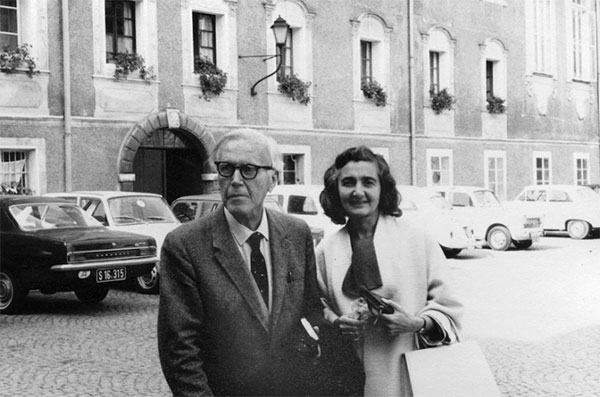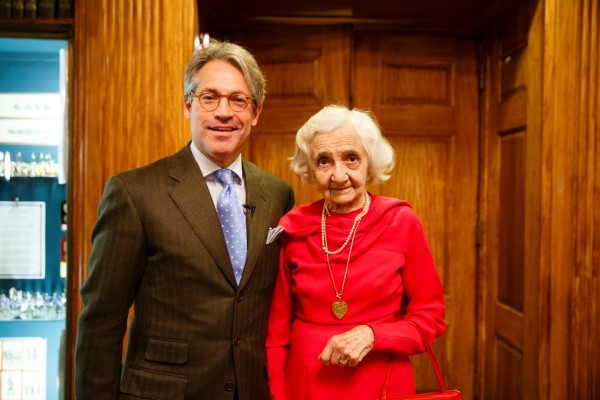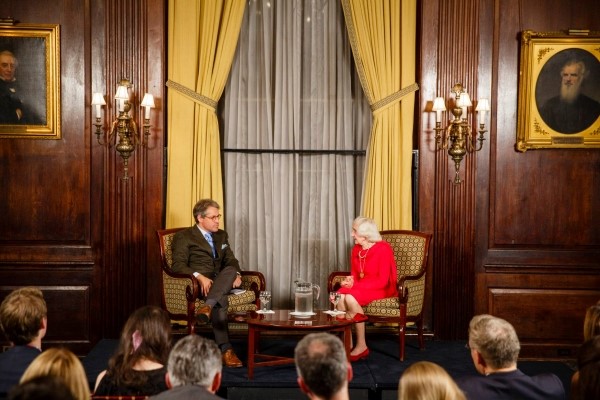Alice von Hildebrand (1923 – 2022)
From Alice Grayson
Founder, Veil of Innocence
As many followers of Veil of Innocence know, I, Alice Grayson, Veil’s founder, did so under the direct personal influence of Dr. Alice von Hildebrand , who was affectionately known as “Lily.” Lily was indeed the perfect nickname for this woman who devoted her life to forming her many followers to love the virtue of purity, in all states of life- single, consecrated celibacy, and holy marriage. Lily served on the board of directors of Veil of Innocence for twenty-one years.
I grew so close to Lily that I would call her my adopted mother, and she thought of me as her adopted daughter. We laughed as she aged, that our roles were reversing, and I would be looking out for her needs, rather than the the other way around.
In her later years, each time my husband and I visited Lily, she would repeatedly say, “ Friendship is the remnant of paradise.” Her joy was being close to her friends and sharing in their lives. She lived through us.
Lily’s fast death caught us by surprise, even though she was 98! Lily started to sleep more and more this week, and John Henry Crosby of the Dietrich von Hildebrand Legacy Project was notified about this concern. A kindly priest visited Lily and celebrated Holy Mass for her, and anointed her.
Although I was not able to be with Lily at the time of her passing, I was able to call the nurse’s cell phone and asked her to put the phone next to her ear. I told her that I was coming the next day, but it was alright if God wanted her sooner. And a lot more…
I have worked closely with the von Hildebrand Legacy Project over the years to help with Lily’s single purpose of translating and publishing her husband’s work. Recently we have launched the website, alicevonhildebrand.org, dedicated to Lily’s contribution of teaching von Hildebrand philosophy.
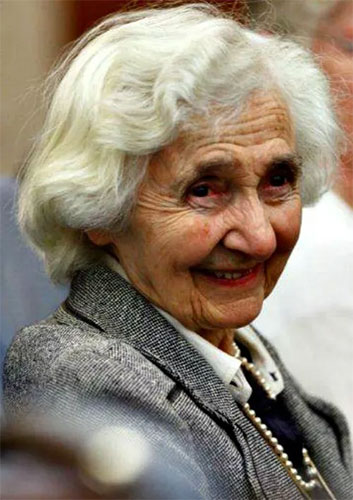
Services:
Wake: Friday, January 21, 3-6pm, Fred H. McGrath & Son Funeral Home (20 Cedar Street Bronxville, NY 10708)
Funeral Mass: Saturday, January 22, 9:30am, Church of the Holy Family (83 Clove Road, New Rochelle NY 10801)
From John Henry Crosby
von Hildebrand Legacy Project
Our dear friend and sister Alice von Hildebrand has gone to meet her Lord.
Dear Friends,
With sadness suffused by joy, I write to share that our beloved friend and sister Alice von Hildebrand went home to the Lord at 12:25am on January 14, 2022. She died peacefully at home after a brief illness.
Those who knew Lily often heard her say that the wick of her candle was growing ever shorter. In fact, she yearned for death — to see the face of Our Lord, to be reunited at last with her husband Dietrich, her parents, her dearest friend Madeleine Stebbins — with the peace that only true innocence and profound faith can grant.
Faithfully and Gratefully,
John Henry Crosby,
President & Founder
von Hildebrand Legacy Project
Obituary
von Hildebrand, Alice March 11, 1923 – January 14, 2022
Alice Marie (née Jourdain) von Hildebrand, known to family and friends as “Lily,” was born in Brussels, Belgium, on March 11, 1923. The third of five children (three sisters and one brother), she was educated by the Canonesses of Saint Augustine in Brussels. Her native language was French. She died peacefully at home in New Rochelle, New York on January 14, 2022.
When the Nazis invaded Belgium in May 1940, Lily (then 17) and her four siblings fled with their parents to Bordeaux. From there, at the invitation of her aunt and uncle living in New York City, she and her elder sister Louloute were able to board the SS Washington, the last passenger vessel to depart France during the war. While sailing from Lisbon to Galway to pick up additional refugees, the SS Washington was intercepted by a German U-boat. On deck, faced with the prospect of death, Lily had a life-changing experience. Looking out onto the “mysterious, fog-covered Atlantic, … with a clarity and precision that approached the supernatural, all of a sudden, in a single flash, I relived everything I had ever done, failed to do, thought, imagined, felt. The experience was overwhelming and convinced me of God’s goodness. Could I not assume that, at the very moment of death, God would grant this experience to everyone, so that each person would have the chance to say, ‘have mercy on me, my Lord’”? The captain of the SS Washington was eventually able to convince the U-boat commander that he was carrying refugees, and they were permitted to continue their journey, arriving in New York Harbor on June 21, 1940.
The six years she spent with her aunt and uncle, despite living with them in the Waldorf Astoria in New York, were extraordinarily difficult for Lily. She was thought unfit for further studies, and even sent to secretarial school. Eventually, she was allowed to enroll at Manhattanville College. One of her philosophy professors there was Balduin Schwarz, a student of the eminent Catholic philosopher Dietrich von Hildebrand, who invited Lily to attend a talk by Dietrich on November 27, 1942. Dietrich spoke on “the readiness to change,” a theme in his major religious work Transformation in Christ. This encounter became the great turning point of Lily’s life. “From the first moment he began to speak, I felt that he was feeding my soul with a food that I had always longed for. He spoke out of a deep recollection, and I drank in every word…. After twenty-nine months of darkness, the sun again rose in my life.”
Even before completing her BA, Lily began taking classes with Dietrich at Fordham University in 1943. She became acquainted with Dietrich’s first wife, Margarete (who died in 1957), and became an integral member of the Hildebrands’ circle of friends. Soon after beginning her studies with Dietrich, she began to assist him as his secretary. Over the coming decades, she typed many of his book manuscripts (which he always wrote by hand) and translated a number of his essays into English. She is surely the reason certain of his works saw the light of day. Not only did she supply most of the footnotes for his books; she became a true philosophical collaborator, reading and discussing his works in progress.
When her aunt and uncle returned to Belgium in 1946, she was forced to accompany them. Determined to complete her studies, she persuaded her parents to let her go back to New York. This time, she was not living in the splendor of the Waldorf Astoria, but in a modest apartment with her beloved sister Louloute and with Madeleine Froelicher (later Stebbins), who would be her closest friend for nearly 80 years. They met in the fall of 1943 at one of Dietrich’s evening lectures. Lily never forgot that first impression of Madeleine: “She was so radiant, pure, enchanting, feminine, graceful, and warmhearted that I immediately thought, ‘I wish she were my friend.’”
As Lily’s resources dwindled, she desperately searched for a teaching position at Catholic colleges around New York. Despite excellent credentials, she was repeatedly told: “It is not the policy of Catholic colleges to appoint women to teach philosophy.” But she was introduced to the chairman of the philosophy department at Hunter College in New York City, who hired her for a three-week substitute position in December 1947. She prepared for those first classes with “the intensity that only despair can fuel.” Despite being certain of having failed, after those three weeks she was offered a position in a new Hunter College veterans program in the Bronx.
Thus began a teaching career at Hunter College that would span 37 years. From the start, she faced opposition from her own colleagues, in part out of professional rivalry (she quickly became one of the most popular professors) and in part because of anti-Catholic sentiment. The latter surprised her, because she never spoke of Catholicism in the classroom. The difficulty was that several of her students began converting to Catholicism. She soon realized that it was her defense of the objectivity of truth against the prevailing relativism of the day that prepared the ground for these conversions. “If someone finds the truth,” she would say, “he automatically finds God, because God is the truth.”
Lily retired from Hunter College in the spring of 1984. Just as the semester was winding down, she received a call from Hunter President Donna Shalala, informing her that she had received the highest student evaluation in the College (from among 850 teachers) and would receive the award for Excellence in Teaching during graduation at Madison Square Garden.
Lily had married Dietrich in July 1959. She often spoke of their unique partnership: complete unity in love of philosophy, music, literature, art, and above all, their Catholic faith. They had a great love for the sacrality of the liturgy and the Church’s heritage of sacred music. Together they formed an extraordinary partnership in bearing witness to Christian culture and Christian life.
In the years after her retirement from teaching, she lectured in 35 US states, Canada, Mexico, and in many countries in South America and in Europe. In these years she also began to develop her understanding of femininity — informed by her husband’s thought on love, but also distinctively her own, as expressed principally in her books The Privilege of Being a Woman and Man and Woman: A Divine Invention. Her book By Grief Refined was borne of the experience of becoming a widow with Dietrich’s death in 1977. In addition to her book Introduction to the Philosophy of Religion, she has left behind a rich body of essays on the nature of education, reverence, liturgy, marriage, and many other themes. She had a particular affinity for Plato, St. Augustine, Pascal, and Kierkegaard, returning to them for inspiration throughout her life.
In addition to her many years at Hunter College, she taught at several other institutions, including the Catechetical Institute of St. Joseph’s Seminary, Dunwoodie, NY, Franciscan University of Steubenville (where she served on the board of trustees for 13 years), the Thomas More Institute in Rome, Ave Maria College in Michigan, and the Notre Dame Institute in Arlington, VA. She served on the board of Veil of Innocence and lent her support to innumerable Catholic apostolates and causes. Throughout her career she received numerous awards and three honorary degrees, including from Franciscan University. In 2013, she was invested Dame Grand Cross of the Equestrian Order of St. Gregory for her dedicated witness and leadership within the Catholic Church.
Lily became a household name through her early association with Mother Angelica and EWTN. She made over 80 appearances on EWTN, including two series with Fr. Benedict Groeschel, CFR: Suffering and What to Do With It and Man and Woman: A Divine Invention.
After Dietrich’s death, she saw her primary mission to be the preservation of his legacy. In 2001, she published The Soul of a Lion, a biography based on Dietrich’s memoirs. She also devoted two EWTN series to her husband’s life: A Knight for Truth with Thomas Howard, and He Dared Speak the Truth with John Henry Crosby. In 2004, she joined John Henry Crosby and John F. Crosby to establish the Hildebrand Project as a vehicle for perpetuating her husband’s legacy. She was particularly instrumental in inviting the support of Joseph Cardinal Ratzinger/Benedict XVI, which proved crucial for the Hildebrand Project. She collaborated with John Henry in the production of My Battle Against Hitler, featuring her husband’s memoirs and anti-Nazi essays. She also worked closely with John Henry in writing her own Memoirs of a Happy Failure. The website www.alicevonhildebrand.org is devoted to her work.
Lily is survived by her sister Marie Laure (“Flotte”) Gillis (b. 1928) as well as thirteen nieces and nephews and their children. She is predeceased by her father Henri Jourdain (1892-1972) and mother Marthe (née van der Vorst) Jourdain (1899-1976), her brother Robert (1921-1961), and sisters Marie-Hélène (“Louloute”) Peeters (1922-2018) and Christiane (“Titane”) Jourdain (1935-2015).
In lieu of flowers, Lily requested that masses be said for the repose of the souls of her husband and herself, and that donations be made to the Hildebrand Project (www.hildebrandproject.org).
Calling Hours: 3 to 6 pm, Friday, January 21, 2022
Mass: 9:30 am, Saturday, January 22, 2022 at Holy Family Church, New Rochelle
In Lieu of Flowers: Lily requested that masses be said for the repose of the souls of her husband and herself, and that donations be made to the Hildebrand Project (www.hildebrandproject.org).
Homily at the Funeral Mass of Alice von Hildebrand
Holy Family Church, New Rochelle, New York January 22, 2022
The Rev. Gerald E. Murray, Pastor
“Therefore, since we are justified by faith, we have peace with God through our Lord Jesus Christ. Through him we have obtained access to this grace in which we stand, and we rejoice in our hope of sharing the glory of God.”
Letter of St. Paul the Apostle to the Romans 5:1-2
As we join together in prayer at this Requiem Mass for the repose of the soul of our beloved friend and mentor Alice von Hildebrand, known as Lily to her friends, we pray that she who had such deep faith in the truth who is our Lord Jesus Christ, that she who radiated the peace that God bestows on those who love Him may now see the fulfillment of her hope, sharing in the glory that God bestows on His good and faithful servants who have received the supreme gift of the beatific vision, seeing God face to face.
Before the body of a deceased Catholic is brought to the parish church for the Requiem Mass, the Church offers this prayer at the wake: “O Lord, we commend to you the soul of your servant Alice, that having departed from this world, she may live with you. And by the grace of your merciful love, wash away the sins that in human frailty she has committed in the conduct of her life.” Lily asked for Masses to be offered for her soul. She was very conscious of the need that sinners have to seek God’s pardon. In December of 2016 she told a friend: “You know, I have lived a long life. I will tell you a secret. I am ready for it to be over. I think I have done what God wanted me to do. If I died tomorrow, I think I would be grateful. Also, I am a coward: I am afraid of what is coming. I pray for the younger generation. I think we are coming back around in history when people will be killed for their faith. If you are there when I am on my deathbed remind me to say, forgive me my sins, thank you to God and I love you. Have you ever thought about the words you will say on your death bed? Of course, not; you are too young but for me it is very close.” She was only off by five years in predicting her departure from this vale of tears. Those five years, indeed all her 98 years on earth were a gift from God both to Lily and to all those who loved her. Her gratitude to God for all He did for her in this life never wavered, but rather grew stronger. She marveled at her long life as she marveled at everything that God did for her.
In August of 2017 Lily told a friend: “I love the story of Abraham, how Isaac asked him on the way to the mount where God had told him to sacrifice his son, ‘but where is the sacrifice?’ and Abraham responded, ‘God will provide.’ That is how I feel about my death – God will provide the right people and the right circumstances.” The Lord did indeed provide for her as Holy Mass was celebrated in her apartment, and she received the Anointing of the Sick and the Apostolic Pardon, on January 13th. She went to the Lord that very night, shortly after midnight.
Her death brings to an earthly close a truly amazing life. Born in 1923, her journey through this world into the world to come took her in 1940 from her native Belgium to New York, in flight from the Nazi invaders. Her first home here was at the Waldorf Astoria Hotel with her aunt and uncle. Little did she know then that she would spend thirty-eight years at a nearby secular school, Hunter College, teaching philosophy. It was her love of books and learning that led her to Manhattanville College of the Sacred Heart and then to Fordham University, where she studied philosophy under the guidance of the brilliant and courageous Dietrich von Hildebrand, who had fled Munich for Vienna when Adolf Hitler and his Nazi party took power in Germany. His writings against the Nazis put him at the top of the Gestapo list of people to be arrested when the German army marched into Austria. He escaped on the last train out of Vienna and made his way to New York, where he resumed his work as a philosopher and as a Catholic writer and speaker who inspired his students and friends with a deep love of Christ, of the Church and, in particular, of the Church’s sacred liturgy.
Lily soon became his secretary, and after von Hildebrand’s wife Margarete died in 1957, he asked her to marry him in 1959. They eventually moved to New Rochelle and were members of this parish of the Holy Family. My family were also parishioners here. I remember as a grammar schoolboy wondering who this couple was as they sat a few pews ahead of our family at Sunday Mass. I was to find out, to my great benefit, a few years later, when I decided to enter the seminary to study for the priesthood. I discovered the greatness of these two philosophers who defended all that is worth defending so that man may live at peace with himself, with others and with God.
One of the most central themes in the lives of Dietrich and Alice von Hildebrand was the crucial importance of reverence if man is to order his life properly and fruitfully in this world.
Lily wrote extensively about matters of faith in various Catholic publications in the years that followed her retirement in 1984 from teaching at Hunter College. Reverence was a central topic. Let me cite three passages from her articles.
- “The curse of modern men, is that so many of them have lost their sense for wonder and gratitude. Boredom is a punishment for irreverence. Alas, our mind-boggling technological progress has brought with it the curse of taking things for granted and assuming with blind stupidity that there is nothing we cannot know—nothing that he cannot master. Having a small gadget in his hand, one feels that he is the master of the universe. He can click on a button and have the world at his fingertips. Regretfully, we never hear homilists say a word about the sin of being “blasé.” It is a sin because it is a consequence of ingratitude—because it is a fruit of pride and metaphysical arrogance. Every sin brings with it its own punishment.” (“Reverence: The Mother of All Virtue” Catholic News Agency April 26, 2016.
- “What is “reverence?” It is an uplifting and joyful feeling of awe, a response that man is called upon to give to God’s creation which clearly points to the Creator; it is an ever renewed and grateful discovery of the mysteries of being; it is an overcoming of one’s moral blindness preventing us from perceiving the glories of the universe that we live in. It is a joy to perceive how marvelous it is “to be,” and consequently, should make us respond with horror at abortion, willingly and brutally denying existence to others (for I doubt that abortionists would have chosen to be aborted themselves had they had a chance of doing it). They deny life to others; not to themselves. We all should tremble with respect at perceiving a little creature making its dramatic entrance into our world.” (Ibid.)
- “Irreverence is spreading through modem society like a cancer. It is metastasizing and has infected virtually every facet of our everyday life. The authentic meaning of “culture” refers to a refinement, an elevation, a spiritualization of everyday life—that is, it aims to put the seal of the Spirit on our daily activities. Today, however, the word “culture” refers to whatever has been most recently produced. We have forgotten that true culture elevates; it does not drag down. I dare say that much of what we see today is an anti-culture. It certainly cannot be read as a sursum corda (Lift up your hearts)—a call to look upward, triggering gratitude in our souls. It was typical of Plato’s genius that he would warn us that one of the main aims of education is to train a child to “love what is lovable, and hate what is mean and ugly.” This is the antidote to the disease of irreverence that is ravaging our society and sickening our culture. When will we avail ourselves of it?” (“The Disease of Irreverence” New Oxford Review, June 2011)
Lily’s love for the truth was a fruit of her love for Christ, who is the Truth. She did not speak about Catholicism in the classroom as Hunter, a secular school. She taught philosophy not theology. But her students who heard about the existence of objective truth in her classes were free to ask themselves questions about the origin of truth. And that led a good number of them to seek answers beyond philosophy. Lily recounted one incident that occurred shortly before she retired:
“Not long ago, in my “Introduction to Philosophy” course, I was discussing truth. I gave my students the classical argument against subjectivism and relativism, namely, that whenever one tries to deny objective truth one must simultaneously claim that one’s own statement is itself true, really and objectively. Suddenly, a male student raised his hand, rose (a most unusual occurrence), and said in a strong, clear voice: “I object, Professor, to your spreading Roman Catholicism in this classroom.” There followed a moment of great tension and my thoughts rushed to God for help. Then I said quietly: “I’m afraid that you are guilty of an anachronism.” Since the student in question did not know what it meant, I explained: “The argument I have been using is taken from Plato who lived some four centuries before the birth of Christ. He can hardly be called a Roman Catholic. This should answer your objection.” I then proceeded with my teaching. Some 16 months later I received a phone call just as I was about to leave for the university, where I was scheduled to proctor exams for the evening. The person who was calling, a former student, said she urgently wanted to see me. I told her that this was not possible since I was to be on duty the whole evening and, furthermore, it was my last day at the university until the fall term. She started to cry over the phone and insisted that she had to see me immediately. Surmising that her problem was truly serious, I contacted a friend of mine who agreed to proctor in my stead.
I then rushed to the university. I hardly had time to take off my coat when the girl who had phoned me came in. I immediately recognized her even though she had never spoken to me personally when she was my student. She had a fine, sensitive face and I had been impressed by her attentiveness and eagerness to listen. To my utter amazement, she told me abruptly that she wanted to become a Roman Catholic. I was so surprised that I was speechless, but I then decided to test her. “Why?” I asked. “Your courses convinced me.” “But”” I responded, “I didn’t say a word about religion in my classes; my topic is philosophy.”
“l know,” she answered, “but do you recall an incident about 16 months ago when a student got up and objected to your refutation of subjectivism and relativism on the ground that you were spreading Roman Catholicism in the classroom? I had been brought up with strong anti-Catholic prejudices. But just when the student spoke out, the grace of God struck me. I suddenly understood that the Roman Catholic Church does stand for the objectivity of truth and that I had been blinded by prejudices.”
“Your course helped me very much and I decided to take another one with you,” she continued. “I heard through another student that you were the wife of a famous Roman Catholic writer, Dietrich von Hildebrand. I rushed to the library and read a couple of his works. Now I am convinced. Please, help me to find a good priest so that I can take instructions in the faith.”
This is how L.C. found her way into the Church. I learned a great lesson through her experience: God is so powerful, so great, that He can use anything for the good.” (“Classroom Conversion” National Catholic Register, March 20, 1983
We give thanks to God for the life of our dear departed friend Lily von Hildebrand. We owe her many debts of gratitude for all that she did for us and for countless others who learned, and will continue to learn, from her example, her writings and her public speeches and media appearances, especially on EWTN. She taught us how to live, and how to die. May she rest in God’s peace, knowing the One who made her, redeemed her and has now called her to Himself.
In Memoriam Alice von Hildebrand
The EWTN Family mourns the passing of our friend, Alice von Hildebrand.
Additional Tributes
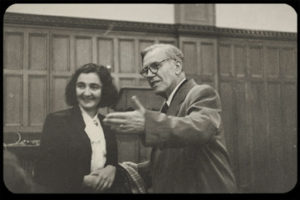
Alice von Hildebrand, Catholic philosopher and critic of moral relativism, dies at 98
Aleteia January 14, 2022
by John Burger
Alice von Hildebrand, a Catholic philosopher who devoted her life to advancing the thought of her late husband, the philosopher Dietrich von Hildebrand, died at her home in New Rochelle, New York, Friday morning. She was 98.
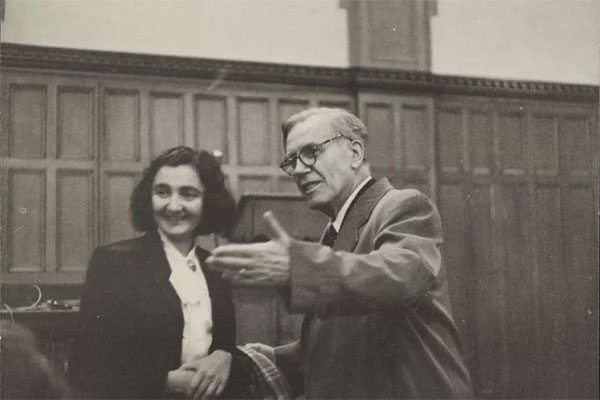
Alice Von Hildebrand: The Passing of a Tigress
by Donald DeMarco
National Catholic Register
She titled her biography of her late husband The Soul of a Lion (2000). When he was close to death, he spoke to her in his native language, which was Italian: Ma sai, sai, la mia anima è ancora un leone (“But you know, you know, my soul is still a lion”). If Dietrich had the soul of a lion, Alice had the soul of a tigress.
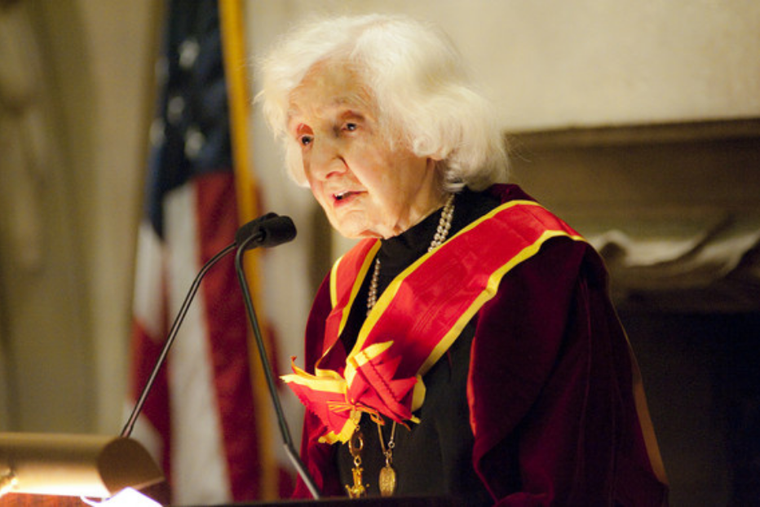
Alice von Hildebrand on her 90 birthday
(photo: Courtesy photo / Hildebrand Project)
Alice von Hildebrand, Catholic Philosopher and Author, Dies at 98
National Catholic Register January 14, 2022
by Kate Olivera/CNA
The legacy of Alice von Hildebrand, a close friend and frequent guest on EWTN, lives on in the lives she touched and in the hearts and minds of those she continues to inspire.
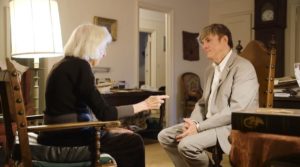
Alice von Hildebrand: Confusion and Suffering
Video interview with Michael Voris, S.T.B
The Church Militant
Alice von Hildebrand, Catholic philosopher who criticized moral relativism, dies at 98
by Harrison Smith
The Washington Post
From Eric Metaxas
Socrates in the City
Friends,
Last night Dame Alice von Hildebrand — one of the greatest women I have ever known — went to be with the Lord, aged 98. Here is my interview of “Lily”, as I was privileged to call her, from Socrates in the City a few years ago.
It was one of the honors and pleasures of my life to know Lily as a friend, and often to howl at her humor. As brilliant as she was — and she was utterly so — there was something inescapably delightful about her. I remember once saying to her how amazed I was that her famous husband Dietrich von Hildebrand was born in 1889. It seemed inconceivable to me. “That’s nothing!” she replied, deadpan. “My father-in-law was born in 1847!” And he was. My own friend’s father-in-law was born when John Quincy Adams was still among us. How could that be?
Lily’s story in Memoirs of a Happy Failure will give you some taste of who she was, as I hope my interview with her will do as well. Last night she joined that “great cloud of witnesses” cheering us on as we “run the race” to which God has called each of us. Do not grow faint, dear friends! It is for this that we were born into this world! Amen.
God bless you,
Eric Metaxas

